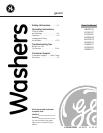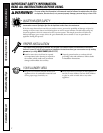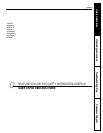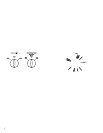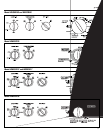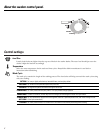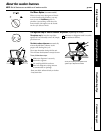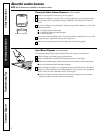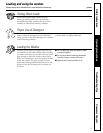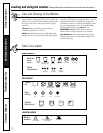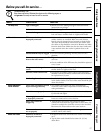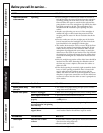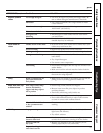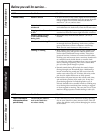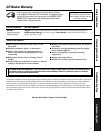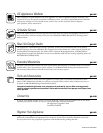
Operating Instructions Safety InstructionsConsumer Support Troubleshooting Tips
PERFORMANCE Possible Causes What To Do
Colored spots Incorrect use of fabric • Check fabric softener package for instructions and follow
softener directions for using dispenser.
• Pretreat stain and rewash.
Dye transfer • Sort whites or lightly colored items from dark colors.
OPERATION Possible Causes What To Do
Washer pauses during This is normal • The washer may pause during the spin cycle to remove
spin cycle soapy water more efficiently.
Washer won’t operate Washer is unplugged • Make sure cord is plugged securely into a working outlet.
Water supply is turned off • Turn both hot and cold faucets fully on.
Controls are not set • Check controls and make sure Cycle knob is pulled out
properly to ON position.
Lid is open—safety feature • Close lid and reset cycle, to the beginning if necessary.
prevents agitation and spinning
when lid is up
Circuit breaker/fuse is • Check house circuit breakers/fuses. Replace fuses or
tripped/blown reset breaker. Washer should have separate outlet.
Before you call for service…
12
WATER Possible Causes What To Do
Water fills and drains Siphoning • If your standpipe or drain for the washer is less than 3
at the same time feet off the floor, the water will drain from the tub while
it is filling. Lifting the drain hose at least 3 feet off the
floor will allow the water to remain in the tub until the
pump drains it out. The anti-siphon clip will lift the drain
hose high enough to do this. The anti-siphon clip is
included with the installation parts package for your
washer.
• Another way siphoning can occur is if the standpipe is
stuffed with rags or other items that prevent air from
escaping with the water. Air flow is needed to break the
suction.
• Check to make sure only the straight part of the drain
hose is inserted into the standpipe; no ribs of the drain
hose should be in the standpipe or drain pipe.
• The washer drain must be 3 feet or more off of the floor
to prevent the washer from draining during fill. If your
washer drain is less than 3 feet above the floor, use the
anti-siphon clip shipped with your washer to attach the
drain hose to the back of your washer. The clip will hold
the drain hose in place and ensure that the washer does
not self-drain during fill. See installation instructions for
details.
• Only the straight top portion of the drain hose should be
inserted into the drain. Inserting the ribbed section of
the hose may create a siphon, and cause the washer to
drain as it fills.
• If the drain opening is excessively tight around the drain
hose, or if the opening around the hose is closed with
rags or other material, a siphon may occur, and the
washer will drain as it fills. To avoid this problem, ensure
that there is open area around the end of the drain hose
to allow air to flow into the drain as water is pumped out
of the washer.



